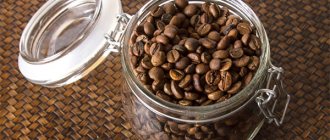Coffee beans are the most popular drink on the entire planet. It gives you energy in the morning thanks to its taste and aroma. In order not to deteriorate the properties and quality of the product, you should know how to store coffee beans. Much depends on temperature, capacity and external factors. The type of coffee is important, because each variety has special storage conditions.
How to properly store coffee beans after opening at home
If you follow simple rules, you can extend the shelf life of a flavored drink without losing its beneficial properties.
Basic conditions:
- You cannot mix several types of product in one container;
- The packaging always indicates the shelf life of the purchased coffee;
- the beans are not placed in direct sunlight or in non-hermetically sealed containers;
- they can be stored from a week to three months, depending on the container;
- It is not recommended to use plastic that tends to transmit odors and harmful substances to products;
- If you open the pack, you need to close it tightly, letting out the air and holding it with a clothespin.
It is worth remembering that when storing coffee in the refrigerator for a short time, it must be placed only on the bottom shelf to maintain the optimal temperature regime.
Why does the product require special storage conditions:
- when interacting with air, the beans oxidize, which leads to a change in taste and decomposition of oily substances;
- high humidity causes bacteria to multiply and mold to appear;
- the aroma of the drink is distorted, notes of acidity and mustiness are felt in the smell;
- Storing it with other products helps the grains absorb other odors, which then spoil.
The influence of external factors on grains leads to their compaction, which entails the appearance of foreign compounds.
Why does coffee go bad?
It is known that coffee beans are a raw material rich in vitamin and mineral complexes, which also contains antioxidants and essential oils. Under the influence of external factors, these compounds quickly disintegrate, which is why fragrant grains lose their unique taste and aromatic qualities.
The following have a harmful effect on fresh coffee raw materials:
- sunlight and direct light;
- moisture in the air;
- oxygen;
- temperature changes;
- foreign odors.
When temperatures fluctuate or when heated, freshly roasted coffee releases vapors and carbon dioxide, causing condensation to form. In open air and light, coffee powder oxidizes and loses its beneficial properties. In addition, the organoleptic picture is disrupted - coffee may become tasteless, unpleasant bitterness, acidity, dusty or metallic taste will appear.
Another distinctive property of coffee is its hygroscopicity. Many may have heard that an appetizing smell kills other aromas, so it is often offered in perfume stores as a “filter” for other odors. Coffee, especially ground into powder, should not be placed next to strong-smelling products, if the raw materials are still going to be brewed - it will absorb foreign impurities, which will make the drink tasteless.
In order for dry coffee to retain its subtle rich aroma, it must be properly stored in accordance with the specifics of the raw material.
Necessary containers for storing coffee beans
Beans do not lose their aroma if high-quality packaging is selected that protects them from external factors. If there is no suitable container other than the factory package, then it is recommended to cut off only a corner and not open it completely. After the grains have been poured out, the corner of the package is wrapped and secured with any clamp. This will increase the shelf life of the product.
If the factory packaging is damaged or you roast the beans yourself, it is better to take a regular jar. Its volume should correspond to the amount of coffee for a week. A sealed lid is required.
How to store fresh ground coffee and what container material to choose:
- metal (practical and lightweight, but the product can absorb the taste of tin containers);
- glass (environmentally friendly material, reliability);
- wood (protects from moisture, but store raw materials for no more than 5 days, and the shelf life of the ground type is reduced to zero);
- ceramics (environmentally friendly, but almost all products are breathable);
- plastic (it is better to refuse such a container, because it emits foreign odors that are transferred to the grains and can be harmful to health).
To enjoy the most delicious and aromatic drink, coffee beans must be stored in the right conditions, so it is very important to choose the right storage container.
How to understand that coffee is not suitable for use
To find out the dangers of expired coffee, it is worth studying the processes occurring in it. Mold fungi may appear, which will negatively affect your health and lead to intoxication. Roasted grains contain fat that can go rancid over time. This can be seen with the naked eye - the beans begin to shine unnaturally, and an unpleasant odor appears.
Spoiled ground powder loses its authentic aroma and becomes tasteless. It can clump, harden, become moldy and damp.
Expired instant coffee can be drunk only when there are no obvious signs of spoilage, it is not damp, not caked, and does not have a nasty aftertaste. The proportion of caffeine in it decreases and it ceases to have an invigorating effect.
How to store ground coffee
Not only whole beans, but also coffee grounds can be stored for a longer period.
Basic Rules:
- in a sealed package, the purchased product can remain for a year in a cool place, but after opening the period is reduced to a month;
- in the store you should pay attention to the pack, which should be dense and compressed;
- After grinding, it is recommended to consume the beans within a week and store them in a tightly closed jar or vacuum packaging.
These simple rules will help you understand where and how long you can store ground coffee product.
Optimal timing and temperature conditions
Proper storage of coffee depends on the temperature at which the beans are stored and their shelf life. Average shelf life of grains:
- fried - 2 weeks;
- fried in a vacuum pack - one and a half years;
- fried in an airtight package - from six months to a year;
- raw - one year;
- raw in a sealed package - up to 5 years.
The main condition for the preservation of beans is the exclusion of ultraviolet rays, oxygen, and moisture.
To prevent coffee from losing its properties and aroma, you should keep it in a place with a stable temperature. The fewer temperature changes, the better. The optimal range is from 18 to 27 degrees, but minor deviations from this norm are possible. Experts recommend that during frequent temperature fluctuations, storing coffee beans only in containers with thick walls.
Shelf life of raw coffee beans
Not everyone is able to purchase green beans, which have a long shelf life and lower cost. The shelf life of unroasted beans with all properties retained is one year, but sometimes this period is extended to three years. Green coffee, which is vacuum-packed or sealed, lasts the longest. When purchasing a product, the date of packaging of the beans is indicated and should be counted from there.
If you purchased loose coffee, you should carefully examine the beans. The matte surface, uniform color and light herbal smell indicate the freshness of the product. It is suitable for long-term storage. If the beans are of different sizes and shades, then this is a collection of different varieties. It is better to refuse the purchase if sand and small particles of debris are visible in the coffee. Seeds that have shriveled at the edges and are odorless but have a uniform structure indicate that they are old. You can buy them, but you should consume them as quickly as possible. Green beans that have passed their expiration date can be identified by being very hard or crumbly, uneven, lacking flavor, or having an unpleasant musty odor.
Important! Raw beans have a herbaceous aroma; the familiar strong smell of coffee appears only after roasting.
Features of storing different varieties and types of coffee
Once harvested, the coffee is fermented and sun dried on site, this is considered primary processing. Next, the beans are usually sent for wholesale to coffee producers from all over the world. At this stage, fresh coffee beans are carefully and quickly transported, and then subjected to additional processing - roasting, and sometimes grinding, sublimation to prepare an instant drink.
Expert tasters work on unique, delicious combinations, offering consumers not only first-class coffee varieties from all over the world, but also their pleasant flavor combinations, called blends. One mixture can combine coffee of different varieties and degrees of roasting.
The shelf life is also influenced by factors such as blending, degree of roasting, maturity and freshness of the beans. Some varieties are harvested green, lightly dried and almost never fried before sale. This is typical for Arabica beans from Ethiopia and some other varieties. This coffee will be full of vitamins, antioxidants and tannins. It cannot be stored for a long time, otherwise the smell may disappear, and a plant “poisonous” bitterness will appear in the bouquet. It can also change beyond recognition: for example, instead of the taste of flowers and fruits, the smell of swamp grass will appear, and the chocolate note will become “dusty.”
More intensely roasted coffee lasts longer, but, as usual, any extremes are detrimental. Strongly roasted coffee that sits for a long time quickly acquires a “dusty” and burnt aroma or simply loses it.
Robusta varieties tend to develop notes of unpleasant bitterness in the bouquet if stored for too long.
The best option is considered to be medium roast and neutral blends of Arabica and Robusta. The peculiarity of such mixtures is the combination of completely different types of coffee. Sometimes this is a plus: while some notes in a bouquet “die off” during long-term storage, others remain. On the other hand, due to this effect, different blends can “fall apart”, changing their aroma beyond recognition.
All this only proves once again that you should not stock up on a valuable product for a long time; it is better to periodically buy fresh grains. If we are talking about buying rare collectible coffee, you should not store it “for the holiday”; enjoy the exquisite taste until it fades into memory.
Shelf life of roasted beans
Compared to green grains, such grains behave differently during storage. Exposure to heat changes the size, color, taste, and smell of the product. The shelf life of beans depends on the conditions in which they are stored:
We recommend:
How to store meringue roll so that it does not go soggy after cooking
- foil packaging extends shelf life up to a month;
- beans can be stored in an unsealed container for up to ten days;
- in four-layer bags, grains are stored for six months, and an additional internal polymer coating increases the period to 9 months;
- in hermetically sealed opaque capsules and jars, the shelf life is one and a half years;
- In heat-sealed packaging with foil or film, grains are stored for up to a year.
When any sealed package is opened, the shelf life of the product will not exceed two weeks.
The impact of expired coffee on human health
If the coffee is over-stayed, first of all, it loses its flavor and aromatic properties and acquires some earthy, rancid, unpleasant aroma. At the same time, experts say that the beans themselves do not have a harmful effect on the body. The only unpleasant symptoms may be heartburn or mild diarrhea.
Coffee that has not been stored properly can be dangerous, especially when it comes to ground coffee or green beans. If there is condensation in the package or foreign moisture has accumulated in the product, there is a high probability of bacteria and fungi breeding; it is best to throw away such coffee without regret.
If the product was unsealed, it could collect dust and harmful impurities, especially if wet coffee was stored in a metal container.
The same applies to brewed coffee that has stood for several hours - it could have time to ferment, even if no sweetener was added to the cup, due to the natural acids and sugars in the product.
If your brewed coffee has an unpleasant aftertaste, you should consider what could be causing it: the utensils, the preparation method, or improper storage. In the latter case, the raw materials need to be sorted or disposed of.
This is interesting:
There is no need to throw away expired coffee. Whole beautiful grains can be used for decorative purposes, for photography, and also as an external sorbent.
Video:
7 facts about coffee that you probably didn’t know Expand
Conditions for storing coffee beans
If possible, it is better to place coffee in the kitchen cabinet, where there are no other products with a strong smell such as seasonings, teas, spices. The container you choose for storing beans must have a hermetically sealed lid; vacuum packaging is also suitable. It is also worth noting that coffee needs different conditions for long-term storage and daily consumption. If the drink is prepared every day, it is better to choose a tightly sealed container. For long-term storage, you cannot do without a vacuum pack or even a freezer. But after defrosting, the beans cannot be refrigerated and should be consumed within 24 hours.
How long does coffee last?
The above recommendations apply if you plan to use the purchased coffee within a couple of weeks. If you prefer to stock up on good coffee for future use, there are several recommendations.
- For long-term storage, a freezer is suitable, but the grains must be frozen immediately after roasting.
- The packaging must be opaque and airtight.
- It is not recommended to remove the entire supply of coffee during the entire storage period; A large amount of coffee can be pre-distributed into separate containers that can hold a week's supply, and then the desired portion can be taken out.
- Before consumption, coffee removed from the freezer must reach room temperature, otherwise it will be impossible to prepare a quality drink.
- The maximum shelf life in the freezer is two months.
Factors preserving coffee beans
To make the drink tasty and aromatic, it is necessary to properly preserve the raw materials for its preparation. Factors that will help keep coffee beans fresh:
- lack of oxygen (use of vacuum packaging);
- temperature changes (it is better to avoid constantly changing the place where coffee is stored);
- low humidity (no risk of mold);
- ultraviolet rays (storage in a dark room).
If these conditions are met, the product will remain fresh for a long period.
Coffee beans can be frozen by pre-packaging them in portions and placing them in a vacuum sealer.
What do we offer
Here you can purchase freshly roasted coffee beans for every taste and varying degrees of roasting! In our store you can buy more than 40 varieties of coffee:
- 100% Arabica or Robusta,
- a mixture of Arabica and Robusta in different proportions,
- Arabica blends from different countries;
- decaffeinated, etc.
We never roast coffee for future use, always only fresh roasting is our rule! We can also grind beans according to customer preference. For better coffee storage and ease of opening/closing, the packaging with a degassing valve is equipped with a zip-lock. We offer reasonable prices, a flexible system of discounts, special offers, and the possibility of free delivery in Moscow and St. Petersburg for orders over 2,000 rubles. and etc.
Tips and tricks
How long does aromatic coffee last in the refrigerator and freezer? The first option is not suitable for either short-term or long-term storage of the product. There are too many foreign odors in the refrigerator that negatively affect the condition of the coffee. And constant temperature changes are detrimental to grains. Beans can be stored in the freezer for up to two months if they are pre-packaged and blast frozen. Re-freezing is prohibited.
Where to store ground coffee and beans? This product should not be placed in direct sunlight or exposed to too high or low temperatures. They also exclude moisture, so there should be no water nearby. The worst solution is to store coffee in the refrigerator or on the windowsill in transparent packaging. It is better to give preference to a hermetically sealed jar, which should be placed in a closed kitchen cabinet away from the oven, window and sink.
For fans of the aromatic drink, it will be useful to know how to store coffee beans at home after opening the package. There is nothing difficult about this, but there are some nuances. It is worth considering whether the grains were purchased in a store ready-made or whether you had to roast them yourself at home. This all affects the shelf life, including the grinding and integrity of the coffee beans. It is better to purchase a high-quality product that has been assembled and stored in the required conditions.
Rate this post
Where to store?
The shelf life of coffee varies depending not only on the packaging, but also on the location. The product can be stored in the closet, refrigerator and freezer. Each location has both advantages and disadvantages.
- Kitchen Cabinet.
This space is ideal for storing the coffee you grind and brew daily. Optimal temperature, absence of moisture and darkness are necessary conditions for the preservation of the product. You should not place a bag or jar of grains in a cabinet located near the oven or stove, or in front of a window that does not face the sun.
- Fridge.
Despite the widespread belief that coffee can and even should be stored in the refrigerator, do not try this experiment at home. The temperature in the refrigerator compartment ranges from +2°C to +6°C. It is not low enough and will not provide freshness to the product. In addition, when the package is repeatedly removed from the refrigerator, the grains become covered with condensation, which turns into water and leads to rapid spoilage of even a fresh product.
- Freezer.
This is the best place to preserve fresh coffee for a long time. However, you need to immediately pour out the required amount of beans that you will use for daily grinding. If you freeze the beans immediately after roasting, they will remain fresh for up to 2 months.
If you choose the right container and storage location, the aroma of freshly ground coffee will fill your home even several months after purchase.











